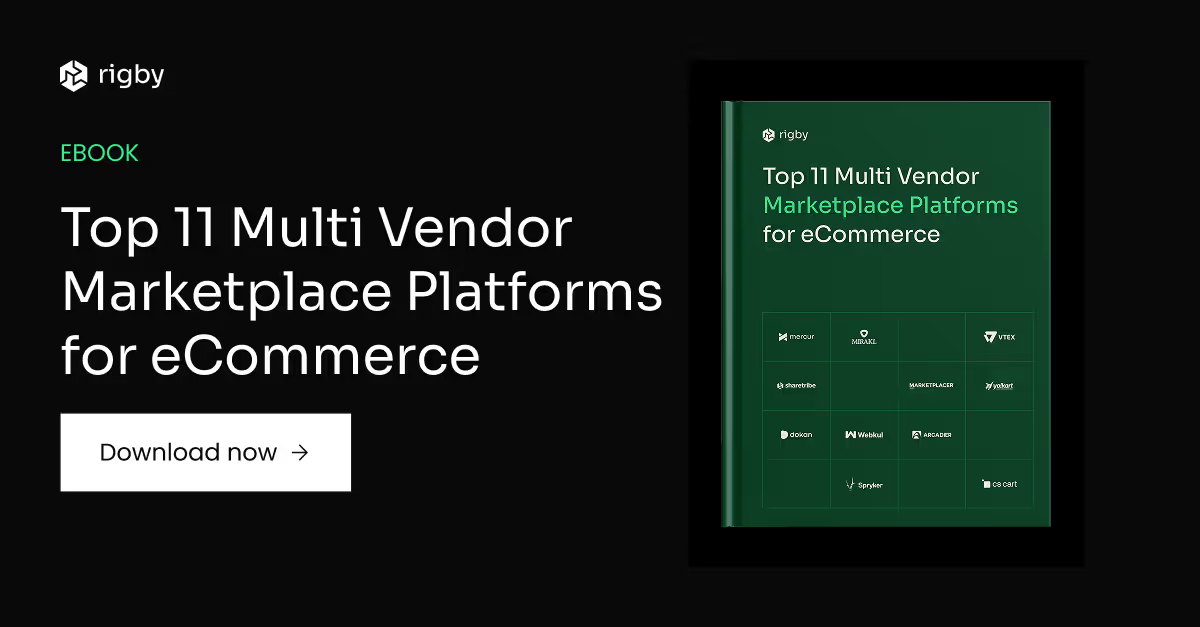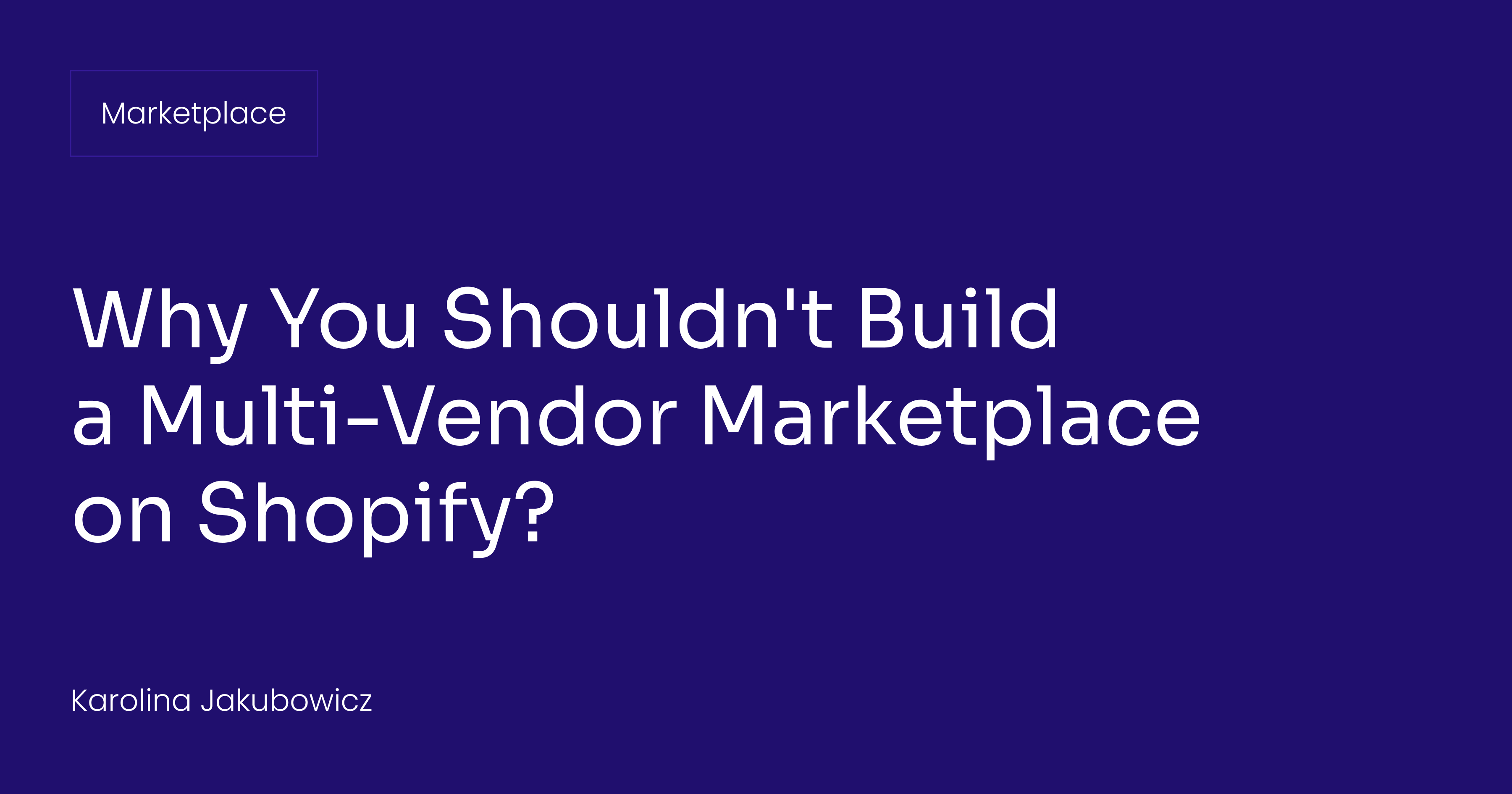Let’s talk about how we can build your commerce project — tailored to your business, powered by Rigby
Globally, online marketplaces account for approximately 67% of global eCommerce sales, making them a key driver of digital commerce growth (Source). So, launching a multi-vendor marketplace can be a great way to expand your eCommerce business.
However, it requires choosing a marketplace platform that can grow and adapt with your business over time.
A good marketplace platform won’t limit your growth, as more vendors join. It allows you to easily add new features or integrations as your business evolves, without being constrained by typical marketplace platform limitations, such as a fixed roadmap or lack of customization.
In this article, we will explore 11 top-rated multi-vendor marketplace platforms that can help you build and manage your company.
If you want to extend this knowledge, check our ebook on this topic - Top 11 Multi-Vendor Marketplace Platforms for eCommerce!

What is the Multi-Vendor Marketplace?
A multi-vendor marketplace is an eCommerce platform where multiple independent sellers can list and sell their products or services. Instead of running separate online stores, these vendors use a shared platform to reach more customers.
Each seller manages their own products, pricing, and inventory, while the marketplace owner handles the overall platform operations.
In simple terms, a multi-vendor marketplace is a virtual space where different businesses come together to offer a variety of items in one place. Customers can browse products from many different sellers, compare prices, and make purchases—all within the same marketplace platform.
Popular examples of multi-vendor marketplaces include well-known platforms like Etsy, where artisans sell handmade goods, and Amazon, which allows businesses of all sizes to sell a wide range of products.
However, in this article, we focus on creating your own marketplace platform. Let's then take a look at how they work.
How the Multi-Vendor Marketplace platform works

A multi-vendor marketplace platform comes equipped with a variety of essential features that allow vendors and marketplace owners to run operations smoothly. Here’s a deeper look at how these platforms function:
Platform setup and customization
Vendors can focus on uploading products, managing inventory, and fulfilling orders, while the platform automates most technical functions. Some platforms even offer advanced customization options, enabling vendors to design a unique storefront while still being part of the larger marketplace ecosystem.
Meanwhile, the marketplace owner handles the overall setup of the platform, which includes key features like user registration, product listing management, shopping cart functionality, inventory control, shipping options, and payment processing. The marketplace platform owner also has the ability to make adjustments to the platform’s overall look, feel, and features to better suit the needs of both vendors and customers.
Vendor management and order fulfillment
Vendors are responsible for managing their own products, inventory, and orders. The marketplace platform provides the necessary tools to make this process easier, including order management systems that allow vendors to track sales, manage stock levels, and fulfill customer orders.
In addition, vendors can communicate with their customers through built-in messaging tools or notification systems on the marketplace platform. This ensures a direct line of communication between vendors and customers, making it easier to handle customer inquiries, manage returns, and solve any order-related issues.
From the marketplace platform owner's perspective, vendor management involves providing multiple vendor support, ensuring vendors comply with marketplace guidelines, and overseeing overall marketplace operations to ensure smooth transactions.
Product listing and management
A typical product listing includes product descriptions, high-quality images, pricing, and shipping details. The marketplace platform provides tools to simplify this process, allowing vendors to easily upload new products, edit existing listings, and update pricing or inventory in real time.
The marketplace platform may also offer features like bulk uploading, SEO optimization, and the ability to categorize products, which helps vendors organize their inventory and attract more buyers.
Benefits of running a Multi-Vendor Marketplace

Running a multi-vendor marketplace offers several advantages, especially for the marketplace platform owner. Below are the main benefits:
Diverse product range without managing inventory
One of the biggest benefits for marketplace owners is the ability to offer a wide range of products without the need to manage inventory or handle logistics. Since vendors manage their own stock and fulfillment, you can focus on growing the marketplace platform without the complexities of inventory management.
Multiple revenue streams
A multi-vendor marketplace provides several ways to generate income. Marketplace owners can earn through commission on sales, subscription fees from vendors, advertising opportunities, or premium services such as featured listings or promotions.
Scalability
As more marketplace vendors join the platform, the product offering and variety grow without increasing the operational burden on the platform owner. The platform can scale naturally, as multiple vendors take care of their own product listings and order fulfillment, making it easier to handle growth.
Lower operational costs
The marketplace owner doesn't have to invest heavily in warehousing, logistics, or procurement. This leads to lower operational costs compared to running a traditional eCommerce store where the owner handles everything.
Attracting a larger customer base
A multi vendor platforms naturally attract a larger customer base because it offers a wide variety of products and services in one place. The more vendors and products you have, the greater the appeal to customers looking for variety, which can help grow the marketplace organically.
Low-risk and high reward
Compared to managing a traditional eCommerce store, a multi-vendor online marketplace spreads risk across many vendors. The failure of one vendor doesn't impact the marketplace as a whole, and the success of one vendor can elevate the platform’s reputation. This structure offers lower financial risk for the owner.
Choosing the right Multi-Vendor Marketplace platform

When selecting the best multi vendor marketplace solution, it's important to choose one that supports your business goals and can scale as your marketplace grows. Here are key factors to consider:
Pricing and cost structure
Some platforms charge a flat monthly fee, while others may take a commission on sales or offer a freemium model with additional costs for premium features. It’s important to consider how the platform’s cost structure aligns with your budget and long-term growth plans. Make sure to account for hidden fees like transaction fees or charges for additional integrations.
Ease of use and vendor onboarding
A platform that is easy to use will save time for both you and your vendors. Look for a platform with a simple setup process, intuitive dashboard, and user-friendly vendor onboarding. This ensures that vendors can start selling quickly without extensive training, and it makes managing your marketplace easier as you scale.
Scalability and performance
Consider how many vendors and products the platform can support and whether it can handle increased traffic without slowing down. A scalable platform ensures that you won’t face performance issues as you expand your vendor base and product offerings.
Customization options
Every marketplace has different needs, so choose a platform that allows for customization. Whether it’s the design of your storefront, the checkout process, or vendor tools, the ability to customize features is essential. Look for platforms that offer flexible APIs and integrations, enabling you to adapt the platform to your specific business requirements.
Integrations and third-party tools
Check whether the platform integrates with the tools and third-party services you already use or may need in the future. This includes payment gateways, shipping providers, marketing tools, and analytics platforms. The more integrations available, the easier it will be to automate and optimize different aspects of your marketplace.
Inventory and order management
Inventory management becomes increasingly complex as more vendors join your platform. Choose a platform with advanced inventory management features that allow vendors to track their stock levels in real-time, set low-stock alerts, and manage shipments seamlessly. Efficient order management tools will also allow vendors to fulfill orders promptly, improving customer satisfaction.
Payment gateways and currencies
For a global marketplace, multiple payment gateways are essential. Ensure that the platform supports various payment methods and currencies to cater to an international customer base. This flexibility in integrated payment gateways options will attract more vendors and buyers to your marketplace.
In the sections below, we will compare 11 top-rated multi-vendor marketplace platforms, helping you find the best solution for your eCommerce business.
1. Mercur

Mercur is an open source marketplace platform built on top of modern Medusa. It offers businesses the ability to build and iterate fast with modern tech, unlimited customization, and no transaction fees.
The aim is to enable users to get started with Mercur marketplace in about five minutes, providing a strong starting point for anyone looking to build their own multi-vendor platform.
Distribution model
Open-source
Mercur is an open source marketplace platform, that gives you full control over your marketplace infrastructure. With complete access to the source code, businesses can customize, extend, and scale their marketplace as needed, ensuring the platform evolves alongside their business without restrictions.
Pricing model
Free
Mercur is completely free as an open-source platform, meaning there are no upfront costs or pricing tiers. The only cost involved depends on whether businesses choose to build the platform themselves or hire technical support for setup and customizations.
Use cases
Mercur supports a wide range of use cases, whether you're selling physical goods, digital items, or services. This flexibility makes it a top choice for custom multi-vendor marketplaces in diverse industries.
For whom
Enterprise-level businesses, scaling startups
Mercur puts the control in the hands of the business, making it the ideal choice for those who want a marketplace that is highly adaptable.
Customization level
High (tailor-made solutions)
What truly sets Mercur apart is its ability to offer tailor-made marketplaces. Unlike most platforms, Mercur’s modular architecture allows complete customization to fit specific business needs, workflows, and designs.
Limitations
Requires development expertise
Because Mercur offers extensive customization options, it requires a certain level of technical expertise for setup and ongoing development. However, this also means you have full control over your platform's growth and evolution.
2. Mirakl

Mirakl focuses on offering a ready-to-use solution that allows businesses to quickly launch and manage multi-vendor marketplaces. Mirakl is a fully managed service, meaning it handles hosting, updates, and maintenance for its users.
Distribution model
SaaS (Software as a Service)
Mirakl is a cloud-based solution, delivered as a fully managed service. This means businesses do not have to handle the technical aspects of hosting, infrastructure, or updates. However, it also means they rely on Mirakl for customizations, which may limit flexibility compared to open-source solutions.
Pricing model
Custom pricing
Mirakl operates on a custom pricing model, typically based on transaction volume and business size. While it offers a number of enterprise-class features, its price tag can be significant for businesses, especially as the number of transactions increases.
Use cases
It is well-suited for large-scale B2C orB2B marketplaces that require a managed platform to handle significant transaction volumes.
For whom
Large enterprises
Mirakl is aimed at large enterprises with complex needs and high transaction volumes. It is particularly useful for businesses that are looking for a fully managed service but may not be suited for those requiring a deeply customized solution.
Customization level
Low to medium
While businesses can make some changes to branding and workflows, they are largely dependent on Mirakl’s built-in features and update schedule.
Limitations
Less flexibility and growth limitation
While Mirakl handles much of the marketplace infrastructure but doesn't allow for deep customization. Businesses looking for full control over their marketplace, or those needing modifications, may find these limitations restrictive.
Additionally, as your business grows, the costs associated with Mirakl can increase, particularly with transaction fees. Many businesses find this frustrating, as the rising costs often become a barrier to growth.
3. Marketplacer

Marketplacer is a marketplace platform that focuses on providing infrastructure with a wide range of features for both B2B and B2C marketplaces.
Distribution model
SaaS (Software as a Service)
Marketplacer is a fully managed cloud-based platform, taking care of the technical aspects such as hosting, updates, and security. It also means relying on Marketplacer's built-in features for most functionality, limiting customization flexibility.
Pricing model
Custom pricing
Marketplacer operates on a custom pricing model based on business size and transaction volume. This pricing model is typical for SaaS platforms but can become expensive as transaction volumes rise, which is something businesses need to account for as they scale.
Use cases
Marketplacer is suitable for a variety of industries, supporting marketplaces that offer both physical products and services.
For whom
Mid-to-large enterprises
Marketplacer is aimed at mid-sized to large businesses. The platform focuses more on retail, healthcare, and services marketplaces. It also positions itself as scalable for businesses that need a less complex, faster-to-launch solution.
Customization level
Low to medium
Marketplacer offers some level of customization, mainly in terms of branding and integrating third-party tools, but it lacks the deep customization capabilities of open-source platforms. Businesses that require specific features or significant modifications to the platform may find this limiting.
Limitations
Limited flexibility and potential cost growth
While Marketplacer is a strong solution for businesses looking for a quick, managed marketplace setup, its limitations in customization, scaling costs, and reliance on the platform’s update cycle may make it less suitable for businesses that want more control and flexibility as they grow.
4. CS-Cart Multi-Vendor

CS-Cart Multi-Vendor offers a self-hosted solution with a wide range of customization options, making it popular for businesses that need more control over their platform but don’t want to start from scratch.
Distribution model
Self-hosted (On-premise)
CS-Cart Multi-Vendor is a self-hosted platform, meaning you have full control over your marketplace’s infrastructure. Businesses can deploy it on their own servers, providing greater flexibility for those who want to manage their hosting, updates, and security. This also means there’s no dependency on third-party SaaS providers.
Pricing model
One-time license fee
CS-Cart operates on a one-time payment model, where you purchase a license for the platform. Additional costs may come from hosting, technical support, or custom development. Businesses can choose to pay for extra support services.
Use cases
CS-Cart Multi-Vendor supports various marketplace types, including physical products, digital downloads, services, hybrid models, and B2B transactions.
For whom
Small to medium-sized businesses, growing enterprises
CS-Cart Multi-Vendor is designed for small to medium-sized businesses and growing enterprises that want full control over their marketplace. It is ideal for companies that prefer a self-hosted solution.
Customization level
High
CS-Cart Multi-Vendor offers a high degree of customization, allowing businesses to modify almost every aspect of the platform.
Limitations
Upfront costs
While the one-time licensing fee may be more affordable, businesses should consider additional costs for hosting, technical support, and potential development work to fully customize the platform. As the marketplace grows, handling large volumes of traffic and transactions may require a more robust server infrastructure.
5. Yo!Kart

Yo!Kart is known for its ease of use, quick setup, and focus on helping entrepreneurs launch their marketplaces efficiently.
Distribution model
SaaS (Software as a Service) / Self-hosted
Yo!Kart offers both SaaS and self-hosted options. Businesses can choose to have the platform managed by Yo!Kart or host it on their own servers.
Pricing model
One-time license fee
Yo!Kart operates on a one-time license fee model, where businesses pay upfront to own the platform. There are no recurring subscription fees, but businesses can opt for additional support or development services at an extra cost.
Use cases
Yo!Kart is flexible enough to handle various product types and vendor needs, making it suitable for industries like retail, fashion, and digital content.
For whom
Startups and SMBs
Yo!Kart is targeted at startups and small to medium-sized businesses looking to launch a marketplace with minimal technical hassle. It’s an affordable option for businesses that need a quick setup with a strong feature set.
Customization level
Medium
While Yo!Kart provides a range of customization options, it is not as deeply customizable as open-source platforms. However, it allows for adjustments in branding, workflows, and design to fit most business needs.
Limitations
Limited deep customization
Although Yo!Kart offers flexibility businesses needing extensive customizations may find it restrictive. Additionally, while the one-time license fee reduces long-term costs, adding advanced features or customizations may require additional development expenses.
6. Sharetribe

Sharetribe is known for its user-friendly setup and is designed for those who want to create a marketplace without requiring technical expertise.
Distribution model
SaaS (Sharetribe Go) / Customizable SaaS (Sharetribe Flex)
Sharetribe Go is a fully hosted SaaS solution, while Sharetribe Flex offers more customization options and is built with APIs for greater flexibility, allowing businesses to design more specific marketplace experiences.
Pricing model
Subscription-based
Sharetribe Go operates on a subscription model with tiered pricing based on the number of users and features required. Sharetribe Flex has a more flexible pricing structure based on API usage and the customization needs of the business.
Use cases
Sharetribe is ideal for service marketplaces, and product-based marketplaces. It’s widely used for niche marketplaces focused on sharing economies, rentals, or connecting service providers with customers.
For whom
Startups, entrepreneurs
Sharetribe is designed for startups, small businesses, and entrepreneurs looking to launch a marketplace with minimal technical effort. It is an excellent choice for those wanting a quick setup without worrying about infrastructure management.
Customization level
Low (Sharetribe Go), High (Sharetribe Flex)
Sharetribe Go offers limited customization options, focusing more on quick deployment with basic features. Sharetribe Flex, however, allows for greater customization through APIs, providing flexibility for businesses that need specific features or workflows.
Limitations
Limited customization and scaling costs
Sharetribe Go is best for businesses looking for a simple, out-of-the-box solution. However, it may not meet the needs of businesses requiring extensive customization.
Sharetribe Flex, while more customizable, may incur higher costs as API usage increases, which could affect scalability as the marketplace grows. Additionally, Sharetribe Go’s limited feature set might not be sufficient for larger businesses or complex use cases.
7. Webkul (Magento)

Magento does not natively offer a multi-vendor marketplace option out of the box. However, you can convert Magento into a multi-vendor marketplace by using Magento multi vendor modules or plugins. The most popular option is the Webkul Multi Vendor Marketplace extension, which adds the necessary functionality for managing multiple vendors on a single platform.
Distribution model
Extension for Magento (Self-hosted or Cloud)
Webkul is an extension that can be installed on Magento (both self-hosted or Magento Commerce Cloud versions). It allows businesses to add multi-vendor functionality to their existing Magento platform while keeping full control over the infrastructure.
Pricing model
One-time license fee
Webkul operates on a one-time purchase model for the extension, with optional paid add-ons and support packages available. The initial cost covers the core multi-vendor functionalities, but businesses may need to purchase additional modules for specific features.
Use cases
Webkul is suitable for marketplaces dealing with physical goods or digital products. It’s ideal for businesses that want to handle a large number of products and vendors in a structured marketplace environment.
For whom
Medium to large businesses using Magento
Webkul is ideal for medium to large businesses that are already using or plan to use Magento.
Customization level
High
Since Webkul is built on Magento, it allows for a high level of customization. Businesses can modify almost every aspect of the platform, including vendor workflows, design, and functionality. Developers have access to Magento’s open-source framework, allowing for deep integration with other third-party tools.
Limitations
Requires Magento setup and management
Webkul requires Magento to function, meaning businesses need to handle the setup, hosting, and ongoing maintenance of the Magento platform. While Webkul provides multi-vendor capabilities, the complexity of Magento itself means that businesses will need technical expertise or external support for both the marketplace and Magento's core functionality. Additionally, costs can increase as businesses may need to purchase additional Webkul add-ons for specific features, and larger marketplaces may require more resources to manage effectively.
8. Arcadier

Arcadier is a multi vendor eCommerce platform that provides a flexible solution for various industries. It offers pre-built templates for different marketplace types and focuses on quick setup and ease of use.
Distribution model
SaaS (Software as a Service)
Arcadier is a fully hosted SaaS solution, meaning all the technical aspects such as hosting, security, and updates are handled by the platform.
Pricing model
Subscription-based
Arcadier operates on a subscription model with tiered pricing based on the features you need and the scale of your marketplace. As your marketplace grows, you can opt for higher-tier plans that offer more advanced features, such as API access and custom branding.
Use cases
Arcadier supports a variety of use cases, including physical products, digital products, and service-based marketplaces. Its pre-built templates cater to a wide range of industries and marketplace types.
For whom
Startups and small to medium-sized businesses
Arcadier is targeted at startups and SMBs that need a quick, easy-to-use solution for launching a marketplace. It is ideal for businesses that don’t want to manage their own infrastructure and prefer a SaaS platform with low upfront costs and minimal technical complexity.
Customization level
Low to medium
Arcadier offers limited customization out-of-the-box, especially for lower-tier plans. Businesses can make basic changes to the branding and layout of their marketplace, but deeper customization is only possible with higher-tier plans that include API access.
Limitations
Limited customization and scalability
Arcadier’s SaaS model means that customization options are restricted, particularly for businesses on lower-tier plans. More extensive customizations require API access, which is only available on premium tiers. Additionally, as businesses grow, they may find that Arcadier’s scalability is limited, both in terms of features and the platform’s ability to handle larger marketplaces. Businesses needing specific workflows or significant customization may find these restrictions challenging as their marketplace evolves.
9. Spryker

Spryker is an eCommerce platform with marketplace capabilities, designed to offer flexibility through its API-driven architecture. Marketplace functionality is an optional extension rather than its primary purpose, making Spryker suitable for businesses looking to expand their eCommerce offerings into a marketplace model without it being the core focus.
Distribution model
Self-hosted / PaaS (Platform as a Service)
Spryker offers a self-hosted solution or can be deployed via cloud platforms (PaaS). This allows businesses to choose their preferred hosting environment.
Pricing model
Custom pricing (subscription-based)
Spryker operates on a custom pricing model. Pricing is typically based on factors such as the number of transactions, the complexity of the marketplace, and the level of support required.
Use cases
Spryker is designed to handle a variety of marketplace types, including physical goods, digital products, and services.
For whom
Large enterprises and complex businesses
Spryker is aimed at large enterprises and businesses with complex, high-volume marketplaces. It’s particularly well-suited for companies that require a scalable, customizable platform.
Customization level
High
Its modular, API-driven architecture allows businesses to create unique marketplace experiences, including custom workflows, integrations, and user interfaces. Spryker is ideal for businesses that need a fully tailored solution and are prepared to invest in development and infrastructure.
Limitations
High setup complexity and cost
The platform is designed for enterprises with technical resources and may require significant development efforts to fully implement. Additionally, Spryker’s pricing model can be expensive, making it less accessible for smaller businesses or those with limited budgets. Due to the platform's complexity, ongoing technical support and development resources are often necessary, which can further increase operational costs.
10. VTEX

VTEX is an eCommerce platform with additional marketplace functionalities, providing an integrated solution that combines eCommerce, marketplace management, and order fulfillment in one system.
Distribution model
SaaS (Software as a Service)
VTEX is a fully hosted SaaS platform, handling all aspects of infrastructure, hosting, and updates. The platform also supports cloud-native architecture, making it scalable.
Pricing model
Subscription-based with transaction fees
VTEX operates on a subscription model with a combination of fixed fees and transaction-based pricing. This allows businesses to scale their marketplace without significant upfront investment, though transaction fees may increase as the marketplace grows, particularly with higher sales volumes.
Use cases
VTEX is ideal for businesses that manage physical products. Its omnichannel capabilities make it suitable for businesses that operate both online and offline, supporting unified inventory and order management across channels.
For whom
Mid-to-large enterprises, omnichannel businesses
VTEX is designed for medium to large businesses, particularly those seeking an omnichannel approach to commerce.
Customization level
Medium
VTEX offers moderate customization, allowing businesses to adjust branding, workflows, and some functionalities. While the platform provides a strong set of out-of-the-box features, deeper customizations may require development resources or integration with VTEX’s API for specific use cases.
Limitations
Transaction fees and limited deep customization
The platform’s transaction-based pricing can lead to higher costs as sales volumes increase, potentially making it expensive for high-transaction marketplaces. Additionally, while VTEX provides flexibility, it lacks deep customization options, limiting businesses that require extensive modifications or unique workflows.
11. Dokan (for WooCommerce)

Dokan is a popular multi-vendor marketplace plugin for WooCommerce. It is known for its ease of use, making it a popular choice for small to medium-sized businesses that want to quickly launch a marketplace without the need for extensive technical knowledge.
Distribution model
Plugin for WooCommerce (Self-hosted)
Dokan is a plugin that works on the WooCommerce and WordPress ecosystem, meaning it requires self-hosted WordPress installations. Users have full control over hosting, updates, and security but must manage these aspects themselves or through a hosting provider.
Pricing model
Freemium (Free version + Paid plans)
The core plugin is free with limited features, while premium versions unlock advanced features like product subscriptions, commission management, and more detailed vendor tools. Pricing for the premium plans varies based on the feature set and support needed.
Use cases
Dokan supports a variety of marketplace types, including physical products, digital products, and service-based marketplaces. It’s versatile enough for smaller retail marketplaces, and niche product sales.
For whom
Small to medium-sized businesses
Dokan is ideal for small to medium-sized businesses or entrepreneurs who want to start a marketplace on a budget. It’s particularly suited for businesses that already use WordPress and WooCommerce or are familiar with the platform and want to leverage its ecosystem without heavy upfront costs.
Customization level
Medium
As a plugin built on WooCommerce, Dokan offers moderate customization options. Users can modify vendor settings, design the marketplace layout, and integrate third-party plugins to enhance functionality. However, deep customization may require technical expertise or additional WooCommerce plugins, as Dokan relies on the WordPress ecosystem.
Limitations
Limited scalability and advanced features
While Dokan is excellent for small to medium-sized marketplaces, its scalability may be limited for businesses with large transaction volumes or those requiring complex, enterprise-level features. As the marketplace grows, users may need to rely on multiple plugins to achieve the desired functionality, which can increase complexity and costs. Additionally, the free version of Dokan offers only basic features, and many advanced functionalities require upgrading to premium plans, which can add to the long-term costs.
Wrapping up...
Multi-vendor marketplace platforms provide a solid foundation to manage engaging online marketplaces that host multiple sellers. With the right platform, you can bring together a diverse range of products and services under one roof, boosting your revenue potential and offering a better shopping experience for your customers.
Factors like distribution model, pricing model, use cases, customization level, and limitations should guide the decision to choose your own online marketplace platform.
If you're looking for expert help in building your marketplace, we are here to assist. We specialize in creating multi-vendor marketplaces, ensuring they are aligned with your business goals and ready for future growth.
Check out our latest work on Natuja, a multi-vendor marketplace built with Mercur that connects customers with natural and eco-friendly products - Transforming Natuja: Migrating from Sharetribe to a Custom-Built Medusa Platform in 9 Weeks.











